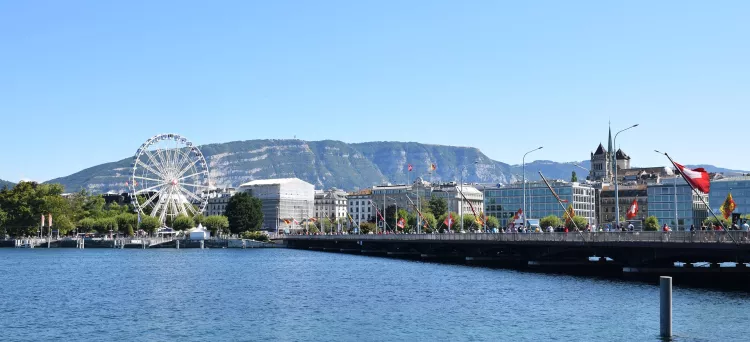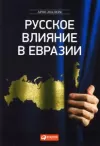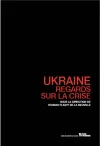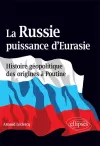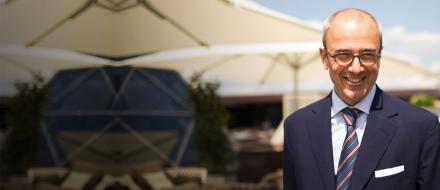Lombard Odier targets clean balance sheet
Swiss private bank follows a strong risk management policy.
The 240-year-old bank is in good shape and has two major and two prime objectives. "First is to have and maintain a very solid foundation and structure of the bank with clean balance sheet and a very strong risk management. Second is to lead ourselves to investments and avoiding any risk to the wealth of our clients as the second largest private bank in the world by assets under management," says Arnaud Leclercq, Executive Vice-President and Partner at Swiss private bank Lombard Odier Darier Hentsch.
"As far structure of business is concerned, we are rock solid. Our business model has been so strong that we have never been in Lehman, Bernard Madoff etc. This is not just luck but a result of strong strategy," added Leclercq.
The bank currently has more than $140 billion (Dh514.22bn) assets under management with more than 70 per cent of them from private wealthy families and individuals while the rest from institutional and pension funds.
"The strategy not necessarily has to be conservative, but dynamic. The strategy has to be discussed and determined with the clients; so in the sense we are much more a la carte. We spend time with family-owned businesses and sovereign wealth funds to come up with some solutions," says Leclercq.
Below are the excerpts from the interview:
What kind of clients are you targeting in this region?
Of these $140bn assets we manage, most of them are from large families including from the Middle East. From prospective clients that we are talking to, we are very closely linked with the network of family-owned businesses. We are also part of the oldest association of family businesses for companies which are more than 200 years old.
How much does the region contribute to assets under management?
We have about $3bn to $5bn from Arab world. I'm expecting an increase and we are working hard for that. We don't want too many clients but quality clients.
Do you have plans to launch a fund in the region?
We have some funds which we think are going to be very successful in this region. The new fund is an energy fund which is very special in the sense that we have partnered with one of the most successful businessmen in this part of the world in the energy sector. This gentleman sold his business to Chinese for $8bn last year. He has worked and created wealth over the past 30 years in the oil production and exploration business. He has seeded this fund with $500 million of his own money. So his technical and geophysical expertise together with our 200-year experience of managing money, we have teamed up to compete with any fund of its kind in the world.
This fund will invest in all energy asset classes and is not proxy to oil price. It will invest in all energy assets; it could be mid-cap companies, new technology; it could be in China, Nigeria or Pakistan or the UAE. It is going to work as hedge fund as well.
With regard to target, we feel comfortable at $2bn. But it can be more because energy is large enough for investments. We offered this opportunity to some people – including sovereign wealth funds and family-owned businesses – in Kuwait, Qatar and Abu Dhabi and they have shown interest to invest in this fund. The fund was launched in June but we started investing in January 2010.
Will you be able to raise $2bn this year?
It's difficult to say; we may not be reaching $2bn but $1bn this year.
What are the new investment trends emerging among SWFs and family businesses?
There are two ways of looking at it. One is short term; you cannot invest all of your money in short term; and you have to keep some investments in the long term. These days, part of our asset management has been more of short term. When you are driving into fog, you don't drive full speed. Some of the world's largest developed countries are being effectively financed by developing world; everything is upside down. You have huge deficits and a huge amount of debt in these developed countries; even some of them are in recession, compared to other developing countries such as China, India and Russia which are, on the other hand, growing fast. These have to be taken in to consideration; we have also been commodities investors successfully over the past few years, primarily in gold. We are one of the most successful investors as far as gold is concerned.
We are also now investing in currencies; we prefer developing countries' currencies such as the rupee, riyal versus the dollar.
On the forex side, we tend to be negative on the euro. Currencies over the next few years are going to be very volatile. There is going to be appreciation of some developing currencies against the dollar.
In short-term outlook, it is not the dollar that is strengthening but the euro which is weakening.
Situation is far from being solved in the US.
There are some positive signs of growth going up but still the unemployment is high. We also believe in the local currencies so we are launching funds in their currencies.
How different is this region when it comes to investments by women?
Women seem to be more risk-averse; they don't like too much leverage and debt. They are more of long-term investors so their short-term investments are less. So these are some trends. By nature, women are more concerned by transmission of life, value and wealth when it comes to
children; men tend to be riskier than women. In the Middle East, by tradition the daughters get less than the sons which is understandable because the sons or the older brothers has to take care of sisters in case of need; so this is logically an traditionally more assets being transferred to the sons.
Women have not only inherited wealth but also some businesses. They happened to be running and managing business very successful. The women in the Middle East have been investing more private money into real estate. That is risk as we know now that real estate is not a liquid investment to some extent. Basically if your tower is not rented you are burdened, so the charges to hold such assets can be expensive.
Are family-owned businesses and SWFs coming back to market?
They are very keen in investing and preserving their wealth. Now there is also flight to quality. And because of the crisis and because of who we are, we have had quite substantial worldwide net new inflows of money coming in to our bank– not just from Middle East. The clients have understood that they want to differentiate commercial business – corporate finance and personal banking – from family wealth. And they have understood that this must not be in the same pot. They should be separate. It led to growth of assets with us.
Article published in Emirates Business, 24/7, on 30 June, 2010.

